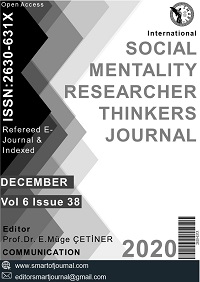Author :
Abstract
Girişimcilik, ülkelerin ekonomik kalkınmasında bir katalizör olarak rol oynar. Günümüz iş dünyasında başarının anahtarı yaratıcılık ve yenilikte yatmaktadır. Yaratıcı ve yenilikçi olmanın yolu da girişimci olmaktan geçer. Son yıllarda büyük ekonomik gelişmelerin yakalandığı ülkelerde, genç nüfusa yönelik girişimcilik eğitimlerinin arttığı ve gençlerin girişimciliğe yöneldiğine şahit olunmaktadır. Gelişmekte olan ülkemizde gençleri girişimciliğe yönelmeye teşvik etmeye yönelik çalışmalar yapıldığı görülmektedir. Bu sürece katkıda bulunmak amacıyla, gençlerin gelecekte kendilerini girişimci olarak görme yeteneklerini ortaya çıkaran girişimci öz-yeterlik olgusu ve girişimci öz-yeterliği olumlu yönde etkilediği düşünülen ruhsal zeka olgusu ele alınmış ve bu iki olgu arasındaki ilişki sorgulanmıştır. Araştırma sonucunda ruhsal zekanın girişimci öz-yeterliği anlamlı ve olumlu yönde etkilediği sonucuna varılmıştır.
Keywords
Abstract
Entrepreneurship plays a role as a catalyst in the economic development of countries. In today's business world, the key to success lies in creativity and innovation. The way to be creative and innovative is also through being an entrepreneur. In countries where great economic developments have been achieved in recent years, it is witnessed that the entrepreneurship training for the young population has increased and young people are directed towards entrepreneurship. It is seen that in our developing country, efforts are made to encourage young people to turn to entrepreneurship. In order to contribute to this process, the phenomenon of entrepreneurial self-efficacy, which reveals the capabilities of young people in seeing themselves as an entrepreneur in the future and the phenomenon of spiritual intelligence, which is thought to positively affect entrepreneurial self-efficacy, were discussed, and the relationship between these two phenomenons was questioned. As a result of the research, it was concluded that spiritual intelligence affects entrepreneurial self-efficacy significantly and positively.
Keywords
- Akgemci, T. & Bekis, T. (2013). “Liderlikte Ruhsal Zeka Üzerine Bir Alan Araştırması”, Sosyal
- Akgemci, T. & Bekis, T. (2013). “Liderlikte Ruhsal Zeka Üzerine Bir Alan Araştırması”, Sosyal Ekonomik Araştırmalar Dergisi, 13(26), 283-300.
- Aydintan, B. (2009). “Ruhsal Zekânin Dönüştürücü Liderlik Üzerine Etkisini Araştıran Uygulamalı Bir Çalışma”, Atatürk Üniversitesi İktisadi ve İdari Bilimler Dergisi, 23(2), 257-274.
- Baron, R. A. (2004). “The Cognitive Perspective: A Valuable Tool for Answering Entrepreneurship's Basic “Why” Questions”, Journal of Business Venturing, 19(2), 221-239.
- Baum, R. J.; Locke, E. A. & Smith, K. G. (2001). “A Multidimensional Model of Venture Growth”, Academy of Management Journal, 4(2), 292-303.
- Chin, S. T. S.; Raman, K., Yeow, J. A. & Eze, U. C. (2014). “The Contributing Roles of EmotionalIntelligence and Spiritual Intelligence in Entrepreneurial Innovation and Creativity”, World Journal of Management, 5(2), 66-77.
- Cook, S.;, Macaulay, S. & Coldicott, H. (2004). Change Management Excellence: Using the Four Intelligences for Successful Organizational Change. London: Kogan Page Limited.
- Forbes, D. P. (2005). “The Effects of Strategic Decision Making on Entrepreneurial Self– Efficacy”, Entrepreneurship Theory and Practice, 29(5), 599-626.
- Henley, A. (2017). “Does Religion Influence Entrepreneurial Behaviour?” International Small Business Journal, 35(5), 597-617.
- King, D. B. (2010). “Personal Meaning Production as a Component of Spiritual Intelligence”, International, Journal of Existential Positive Psychology, 3(1), 1696-1708.
- Krueger, N. F.; Reilly, M. D. & Carsrud, A. L. (2000). “Competing Models of Entrepreneurial Intentions”, Journal of Business Venturing, 15(5-6), 411-432.
- Larigol, Z.; Ghanifar, M. H., Aho, G., Shahabizadeh, F. & Jarahi, J. (2020). “Role of SpiritualIntelligence in Entrepreneurial Self-Efficacy With Mediating of Strategic Thinking”, Health, Spirituality and Medical Ethics, 7(2), 50-58.
- Seyfi, U. Y. & Kose, S. (2016). “Ruhsal Zeka ve Çalışma Algısı Üzerine Bir Analiz”, Yonetim ve Ekonomi, 23(3), 767-787.
- Tsai, K. H.; Chang, H. C. & Peng, C. Y. (2016). “Extending the Link Between Entrepreneurial Self-Efficacy and Intention: A Moderated Mediation Model”, International Entrepreneurship and Management Journal, 12(2), 445-463.
- Yurttas, E. (2018). “Ruhsal Zeka İle Karar Verme Stilleri İlişkisi: Yöneticiler Üzerinde Bir Uygulama”, Yüksek Lisans Tezi, Çankaya Üniversitesi Sosyal Bilimler Enstitüsü, Ankara.
- Zhao, H.; Seibert, S. E., Hills, G. E. (2005). “The Mediating Role of Self-Efficacy in theDevelopment of Entrepreneurial Intentions”, Journal of Applied Psychology, 90(6), 1265-1272.





